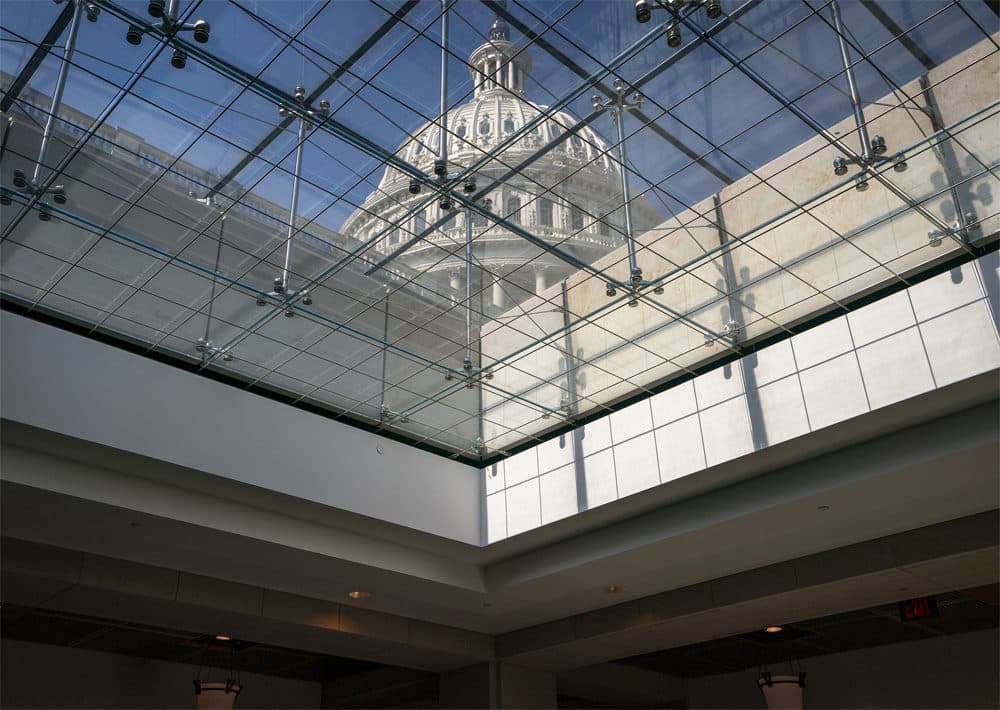Advertisement
How History Informs The Trump Impeachment Inquiry

Democrats in the U.S. House of Representatives could push for depositions to begin this week as Congress considers whether to impeach President Trump.
Trump is far from the first president to face calls for impeachment.
Boston College American history professor Heather Cox Richardson and Boston University associate professor of social sciences Thomas Whalen joined us to discuss what we could learn about impeachment proceedings in the past.
Interview Highlights
On what make this impeachment inquiry unique
Heather Cox Richardson: That political answer to the problem of having somebody in office who shouldn't be is a reflection of a time when politicians did not have any concept of political parties. In this moment, we are seeing Republican leaders standing behind what, on their face, is impeachable behavior and saying, "No, this is not what's really happening." And I just don't think we have seen that.
Thomas Whalen: In the prior impeachment processes that were started, it was really stemming from domestic issues. This is about the security of our nation. And if you look at the original Constitutional Convention as they're figuring out what impeachment should be about and what it should embody, our Founding Fathers thought this is precisely what we are worried about.
[Trump] is, for his own personal reasons, trying to influence an election by inviting in foreign intervention. And that is not in line with what the Founding Fathers had in mind in terms of having free and elected democratic government.
On parallels between Nancy Pelosi and former House Speaker Tip O'Neill, who ultimately called for Nixon's impeachment
TW: Well, timing is everything in politics. Tip O'Neill said this — that if they had voted when Father Drinan wanted them to vote on his resolution for impeachment, they easily would have lost. The great mistake of the Republicans in Congress was that they didn't demand an immediate vote on impeachment on Nixon. Instead, they delayed the process enough so that public opinion could catch up with what they had discovered through their investigations.
HCR: And by the way, this happens a lot. We often get impeachment inquiries or moves for impeachment inquiries on one president or another, and it doesn't go anywhere. There is such a tornado of news that it's very hard to make a clear case to the American public. That's what Nancy Pelosi was waiting for, and that's what Trump just handed to her on a silver platter.
On similarities between Nixon and Trump
TW: I think that in terms of his attitudes toward the rule of law, you can make the argument that they have — almost, you could say — a contempt or just a healthy cynicism of the rule of law and how it functions in our democracy.
HCR: Nixon clearly broke laws. He clearly believed he needed to stay in power to protect the country. But he recognized that he was breaking the law, and he tried to cover it up. I actually don't think this president believes in the democratic system. I think he believes in power and in keeping power in whatever way that can happen. And this is why we have such widespread corruption. The levels of the disruption of our democratic system is way higher today than it was with Nixon simply because Nixon believed in American democracy.
On what the impeachment inquiry means for Trump's chances at re-election
TW: Nixon won a huge landslide victory. But the revelations, all the smoking guns, did not come out until after the election. Same thing with Clinton. This is coming out now. At the very least, this is going to damage him with independent swing voters.
HCR: Some dramatic event often crystallizes popular attention, and the world turns on a dime. The world was a different world a week ago, and the world in a week is going to be entirely different. Not only is Trump in trouble, but the entire Reagan revolution right now is on trial. And it's not going very well.
On what they predict will happen in the next few weeks
TW: I think the House will impeach him. It's going to go to the Senate. And the question is: What's Mitch McConnell going to do? It sounds like Mitch McConnell — what I've heard already — is that he is not going to follow the traditional norms of the impeachment process. He's going to try to keep this as short and tight as possible given the political ramifications. I think that George Mason quoted during the Constitutional Convention when they were discussing impeachment, he said, "Shall any man be above justice?" And that's what we're wrestling with right now and that's what all impeachment cases — that's what we're wrestling with.
HCR: I do think the House will write and then pass articles of impeachment after a somewhat shortened investigation. But I think — and again, I'm a prophet of the past not of the future — I think when it looks like it's going to go into the Senate that Trump is going to end up, either shortly after that or shortly before, resigning and quitting because Mitch McConnell and other Senate supporters are going to go to him and say, "We are dead in the water if this goes before the public right before an election."
This article was originally published on October 02, 2019.
This segment aired on October 2, 2019.

